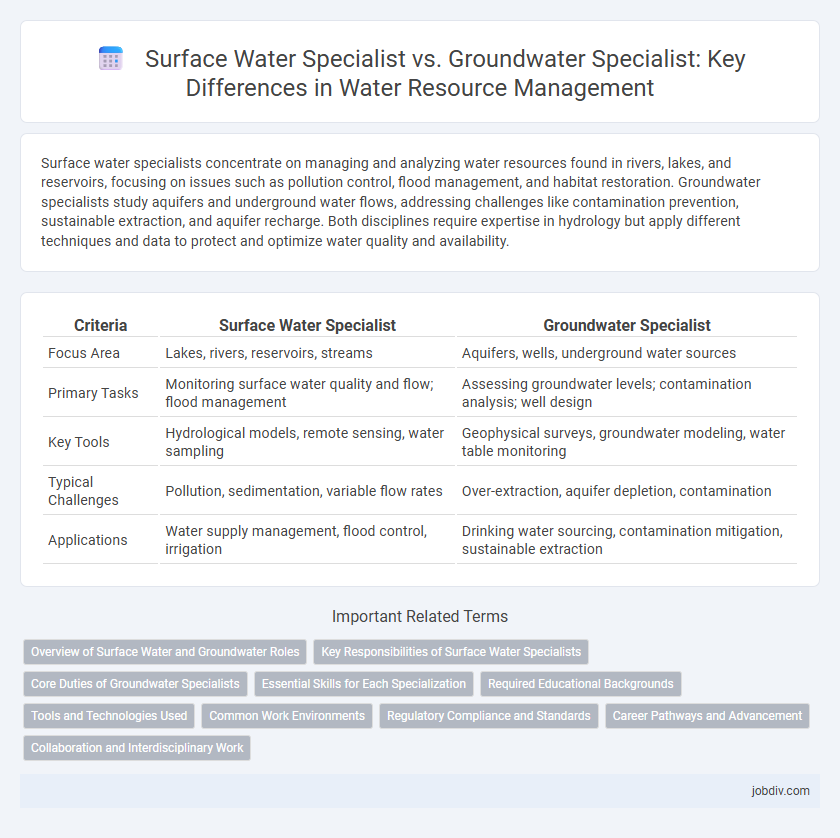Surface water specialists concentrate on managing and analyzing water resources found in rivers, lakes, and reservoirs, focusing on issues such as pollution control, flood management, and habitat restoration. Groundwater specialists study aquifers and underground water flows, addressing challenges like contamination prevention, sustainable extraction, and aquifer recharge. Both disciplines require expertise in hydrology but apply different techniques and data to protect and optimize water quality and availability.
Table of Comparison
| Criteria | Surface Water Specialist | Groundwater Specialist |
|---|---|---|
| Focus Area | Lakes, rivers, reservoirs, streams | Aquifers, wells, underground water sources |
| Primary Tasks | Monitoring surface water quality and flow; flood management | Assessing groundwater levels; contamination analysis; well design |
| Key Tools | Hydrological models, remote sensing, water sampling | Geophysical surveys, groundwater modeling, water table monitoring |
| Typical Challenges | Pollution, sedimentation, variable flow rates | Over-extraction, aquifer depletion, contamination |
| Applications | Water supply management, flood control, irrigation | Drinking water sourcing, contamination mitigation, sustainable extraction |
Overview of Surface Water and Groundwater Roles
Surface water specialists manage lakes, rivers, and reservoirs, focusing on the quality, quantity, and distribution of water that is visible on the Earth's surface. Groundwater specialists analyze aquifers and underground water flows, addressing issues related to water extraction, contamination, and recharge. Both roles require expertise in hydrology, environmental science, and regulatory compliance to ensure sustainable water resource management.
Key Responsibilities of Surface Water Specialists
Surface Water Specialists monitor and manage freshwater sources such as rivers, lakes, and reservoirs to ensure water quality and availability for ecosystems and human use. They conduct hydrological assessments, analyze flow patterns, and implement pollution control measures to prevent contamination and sustain aquatic habitats. Their work includes developing water resource plans, overseeing surface water treatment processes, and collaborating with environmental agencies to comply with regulatory standards.
Core Duties of Groundwater Specialists
Groundwater specialists primarily focus on the assessment, management, and remediation of subsurface water resources, ensuring sustainable supply and quality of aquifers. They conduct hydrogeological studies, monitor groundwater flow and contamination, and develop models to predict water availability and pollutant transport. Their expertise supports groundwater extraction, contamination prevention, and regulatory compliance for water resource management.
Essential Skills for Each Specialization
Surface water specialists require expertise in hydrology, watershed management, and real-time monitoring techniques to analyze rivers, lakes, and reservoirs. Groundwater specialists focus on hydrogeology, aquifer testing, and subsurface contamination assessment to evaluate underground water resources. Both roles demand proficiency in Geographic Information Systems (GIS), water quality sampling, and regulatory compliance to manage sustainable water resources effectively.
Required Educational Backgrounds
Surface Water Specialists typically require a degree in hydrology, environmental science, or civil engineering with a focus on surface water processes, watershed management, and water quality assessment. Groundwater Specialists often hold degrees in hydrogeology, geology, or environmental engineering, emphasizing subsurface flow, aquifer characterization, and groundwater contamination. Both roles benefit from advanced coursework or certifications in water resource management, geospatial analysis, and environmental regulations.
Tools and Technologies Used
Surface Water Specialists utilize remote sensing technology, GIS mapping, and flow measurement instruments like current meters and ADCPs to monitor rivers, lakes, and reservoirs. Groundwater Specialists employ tools such as borehole drilling rigs, piezometers, and aquifer testing equipment, alongside hydrogeological modeling software to analyze subsurface water flow and quality. Both specialists increasingly integrate data analytics platforms and sensor networks for real-time monitoring and resource management.
Common Work Environments
Surface water specialists primarily work in environments such as rivers, lakes, reservoirs, and wetlands, analyzing water quality, flow, and ecosystem health. Groundwater specialists focus on subsurface environments, including aquifers and underground water tables, conducting hydrogeological assessments and managing groundwater resources. Both specialists often collaborate in fieldwork, laboratories, government agencies, environmental consulting firms, and research institutions to ensure sustainable water management.
Regulatory Compliance and Standards
Surface water specialists ensure regulatory compliance by monitoring lakes, rivers, and reservoirs according to Clean Water Act standards, focusing on water quality criteria such as turbidity and pollutant levels. Groundwater specialists adhere to regulations like the Safe Drinking Water Act, conducting assessments of aquifer contamination and managing wellhead protection programs to maintain potable water safety. Both roles require expertise in state and federal environmental guidelines to implement effective water resource management and pollution control strategies.
Career Pathways and Advancement
Surface water specialists often advance by gaining expertise in hydrology, water quality monitoring, and watershed management, leading to roles in environmental consulting or government agencies. Groundwater specialists focus on aquifer characterization, contamination assessment, and well design, progressing into positions within environmental engineering firms or regulatory bodies. Both pathways benefit from advanced degrees and certifications like Professional Geologist (PG) or Certified Hydrogeologist (CHG) for career growth and leadership opportunities in water resource management.
Collaboration and Interdisciplinary Work
Surface water specialists and groundwater specialists collaborate by integrating hydrological data to manage water resources effectively, addressing both riverine and subterranean ecosystems. Their interdisciplinary work combines expertise in surface water flow, groundwater recharge, and contaminant transport to develop comprehensive water quality and supply solutions. This collaboration enhances watershed management, supports sustainable extraction practices, and improves predictive modeling for climate resilience.
Surface Water Specialist vs Groundwater Specialist Infographic

 jobdiv.com
jobdiv.com